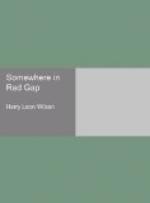“And after supper I’m darned if she didn’t lure him out onto the porch in the moonlight, and stand there sad looking and helpless, simply egging him on, mind you, her in one of them little squashy white dresses that she managed to brush against him—all in the way of cold study, mind you. Say, ain’t we the lovely tame rattlesnakes when we want to be! And this big husky lummox of a Chester Timmins—him she’d called a male—what does he do but stand safely at a distance of four feet in the grand romantic light of the full moon, and tell her vivaciously all about the new saddle he’s having made in Spokane. And even then he not only chokes but he giggles. They do say a strong man in tears is a terrible sight. But a husky man giggling is worse—take it from one who has suffered. And all the time I knew his heart was furnishing enough actual power to run a feed chopper. So did she!
“‘The creature is so typical,’ she says when the poor cuss had finally stumbled down the front steps. ‘He’s a real type.’ Only she called it ‘teep,’ having studied the French language among other things. ’He is a teep indeed!’ she says.
“I had to admit myself that Chester wasn’t any self-starter. I saw he’d have to be cranked by an outsider if he was going to win a place of his own in the New Dawn. And I kept thinking wily, and the next P.M. when Nettie and I was downtown I got my hunch. You know that music store on Fourth Street across from the Boston Cash Emporium. It’s kept by C. Wilbur Todd, and out in front in a glass case he had a mechanical banjo that was playing ‘The Rosary’ with variations when we come by. We stopped a minute to watch the machinery picking the strings and in a flash I says to myself, ‘I got it! Eureka, California!’ I says, ’it’s come to me!’
“Of course that piece don’t sound so awful tender when it’s done on a banjo with variations, but I’d heard it done right and swell one time and so I says, ’There’s the song of songs to bring foolish males and females to their just mating sense.’”
The speaker paused to drain her cup and to fashion another cigarette, her eyes dreaming upon far vistas.
“Ain’t it fierce what music does to persons,” she resumed. “Right off I remembered the first time I’d heard that piece—in New York City four years ago, in a restaurant after the theatre one night, where I’d gone with Mrs. W.B. Hemingway and her husband. A grand, gay place it was, with an orchestra. I picked at some untimely food and sipped a highball—they wouldn’t let a lady smoke there—and what interested me was the folks that come in. Folks always do interest me something amazing. Strange ones like that, I mean, where you set and try to figure out all about ’em, what kind of homes they got, and how they act when they ain’t in a swell restaurant, and everything. Pretty soon comes a couple to the table next us and, say, they was just plain Mr. and Mrs. Mad. Both of ’em stall-fed. He was a large, shiny lad, with pink




